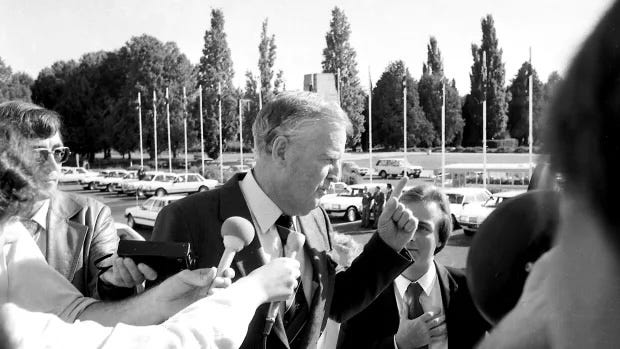Written by John Lawson, find more of his content on 𝕏 @JohnLawson_TNO
Out of disgust towards the condition of the modern West many instinctively turn to systems of government stripped of the decrepit and dishonest qualities which characterise ‘liberal democracy’ in search of alternative solutions. Members of both the Left and Right have in recent years grown comfortable forwarding radically alternate systems of leadership selection and government, authoritarian and libertine alike, however, I believe for the most part they are missing the mark.
Generally, the most alluring aspect of these alternative solutions is the streamlined action-oriented elements they provide, often at the expense of reduced guardrails that might protect against tyrannical abuses of power or corruption.
Some of our country’s greatest men were quasi-dictators; Governor Macquarie, Governor Arthur Phillip and Joh Bjelke Peterson just to name a few. When these selflessly-motivated men come to power society flourishes as they are capable of wielding the full power of the state to swiftly correct societal ills and redirect resources towards rapid technological, moral and legal advancement. Governor Arthur Phillip successfully planted the seed of civilisation on the Australian continent, Governor Macquarie reestablished order after the corruption of his rum-trading predecessor left the colony of NSW in disarray, and Joh Bjelke oversaw the transformational development of Queensland.
On the other hand, however, as we are so often warned by popular and news media - when tyrannical, selfish men claw their way to the top position, little stands in the way of their abusive will. Examples include Governor-General John Kerr who used his station to carry out his petty personal revenge, Governor Macarthur the corrupt rum-trading predecessor of Governor Macquarie, and Joh Bjelke for being Joh Bjelke.
Taking all this into account, I believe that an answer is to be found in Australia’s own history that combines the advantages of democracy (peaceful transitions of power, stability & oversight) with the benefits of authoritarian systems (speed, directness and the ability to pursue a grander vision). This is the system of government that carried 6 colonies at the end of the world to become the Australian nation in 1901 and even still lingered to some degree throughout our rapid ascent from nationhood to a position as one of the world leaders in the realms of quality of life, industry, technological advancement and military capability; that system can be best labelled as illiberal democracy.
‘Illiberal democracy’ as I define it in opposition to ‘liberal democracy’, is a representative system of government in which ministers are selected by a vote limited to only certain subsets of the population, with strict limits on the forces allowed to influence the government formed. A government that resembles this definition could be said to have existed from the 1840s when only wealthy White male landowners had the right to vote, through to the 1850s during which all White men gained the right, through to 1902 when White women followed suit, all the way to its conclusion in the 1940s when all race-based restrictions were finally lifted.
The truly Australian solution to our present decline is to reimpose elements of the anti-liberal democracy that weighted more heavily the opinion of our society’s wisest & most experienced. What would this look like in the modern day? Ideally, it would mean a compulsory requirement that for someone to be eligible to stand as a politician he must be a Christian father of good character, descendant of founding-stock Australians.
More realistically, rolling back the ‘liberal’ element of ‘liberal democracy’ would mean aggressive electoral reform that favours the most conservative elements of society. One way to do this would be to break up some of the largest regional electorates into smaller seats, which owing to the stunted growth of leftism in areas outside of the major cities would in all practicality result in more conservative, Christian founding-stock Australians sitting in Parliament. Similarly, some sort of scheme that awards additional votes to soldiers and ex-servicemen would be another way to give heavier weight to a cohort of Australians who are disproportionately patriotic or possess nationalist instincts. There are many similar solutions (voluntary voting for example) which with enough political will would go a long way to securing a better future for Australia however the details are not especially important at present.
The other half of restoring an illiberal democracy would be entirely freeing our country of all foreign and hostile interests. This would require an aggressive Mccarthyist treatment of foreign operatives no matter whether they are agents of foes or supposed allies. Further, the power of all lobbies, especially those corrosive to the fabric of Australian life, must be sharply curtailed and the political donation process must be made transparent as glass.
The political impracticality of these ideas is not lost on me, I have absolutely no expectation of them being implemented by the current generation of politicians, however, in a hypothetical future where an Australia-first leader rose to power and wanted to safeguard the country from sinking back to its current state the program I have outlined above would be a good starting point.







Great article, John Lawson. Great work as always, God bless!